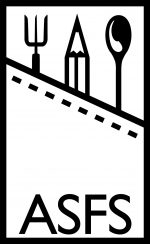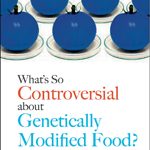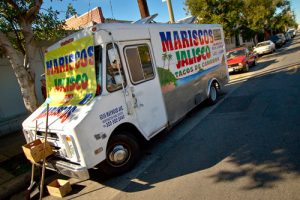The May 2017 Member Spotlight interview is with Dr. John Lang, Professor of Sociology at Occidental College (Los Angeles, CA). This interview was conducted by Dr. Greg de St. Maurice and Dr. Beth M. Forrest.
We found your 2014 article in FS&C, “Sound and the City: Noise in Restaurant Critics’ Reviews,” a particularly interesting subject matter. How did you arrive at the topic? How does noise factor into your personal evaluations of restaurants / food experiences?
When I started at Occidental College (Oxy) in 2008 I was introduced at the first college-wide faculty meeting as a sociologist who studies food. That meant whenever faculty would introduce themselves they would often start the conversations with some remark about their favorite foods or favorite restaurants. One colleague who is a music historian, David Kasunic, who started at Oxy the same year asked “Why are restaurants so loud?” I didn’t really have a good answer. But it started a conversation that we’ve had for a number of years. For him it has meant an exploration of Tafelmusik (German for “table music” or “music for the feast”). For me it started a fascination with things that influence how we feel about restaurants. Sound is one of those ever-present sensations that can influence our mood, purchasing behavior, and enjoyment. But, as it turns out, it seems it can even influence critics’ evaluations of restaurants depending on the city. That was fascinating to me. As for my personal preferences, I tend to fear perfectly quiet restaurants. Some noise helps a restaurant feel alive. I don’t want to feel like I’m forced to participate in the conversations with the table next to me, but hearing other people having a good time is a welcome experience for me.
The subject of your latest book, what’s So Controversial about Genetically Modified Foods? seems like a potential quagmire. What was your strategy for taking on such a controversial subject as objectively as possible?”
I started doing research on GMOs somewhere around 2002. At that time the dominant question seemed to be whether rejection of GMOs, if people had even heard of them, was based on an incomplete understanding of science. It turns out there isn’t a lot of support for that particular theory, though it’s often people’s first thought. Thankfully, as a sociologist the answers seem to be less about the science and much more about social, cultural and ethical meanings surrounding food, not to mention things like corporate concentration, globalization, expertise, and trust. Those are the type of questions and answers that scientists are ill-equipped to handle but are terribly important. So I try to approach things as openly as possible and recognize that as a social scientist I’m ill-equipped to adjudicate the science but I can help scientists see why others might view their work in different ways. In other words, I try to explain why I can understand that scientists say that GMOs are safe and fully believe them but might still have objections of all sorts to GMOs. So for me it was trying to set-up people for having a respectful discussion so that both sides could finally hear each other rather than shouting past each other.
One of the areas that you tackle in your dissertation (about public perception and stakeholders in GMOs) is trust. What things that we, as food scholars (and people who purchase and eat food), might consider at the point of intersection between food and trust?
Food scandals, whether illness or adulteration, makes us think about trust. But given that our globalized food system is so complex it is impossible to know everything. That means we wind up relying on trust for pretty much everything we eat. I think the attempts to de-industrialize and to localize the food system and the emphasis of direct-to-consumer/alternative food networks can be seen as way to allay fear by creating closer connections, making trust feel more personal. Having confidence that the people who supply and sell us food are honest seems to explain our willingness to trust more than anything else.
You are the book review editor of FC&S. What do you look for in book reviews for the journal?
I think some folks want to do a book report rather than a book review. Of course there needs to be some broad exploration of what’s in the book, but the table of contents shouldn’t really structure a review. I’m more interested in a reviewer who intellectually engages with the book, puts in context – whether discipline specific or food studies more broadly – and readers understand where this book fits in the ongoing scholarly dialogue. I want to know what the book does well and not so well. I love reviews with a point of view. In the end I want the reviewers to make clear if the book is well done and worth my time. In other words, is this a book we should want to read, or is it just a book we want to read about.
You did your graduate work at Rutgers, taught at Temple, and you now teach at Oxy. As a sociologist, what are some differences between NJ/PA and LA foodscapes?
There are fascinating discussions to be had about race/ethnicity, immigration, the built environment and on and on. But my thoughts about food from my time in/around NJ/PA are filled with specific food memories, things I tend to indulge whenever I visit including Wawa, Monk’s Cafe, Dmitri’s, and the roast pork, broccoli rabe, and sharp provolone at Tony Luke’s on Oregon Ave. Although cliche, in LA, I continue to be astounded by the year-round availability of amazing produce of all sorts, the incredibly diverse food environment, and the willingness of chefs to ignore convention.
LA17! Our shorts and flip-flops are packed and we are excited about a laid-back conference! (Just kidding). What are some highlights that we should look forward to?
I really think the Wednesday pre-conference events are fantastic. In addition to great writing workshops by Betty Fussell as well as Jonathan Gold and Laurie Ochoa, people can take a Mexican food tour of Boyle Heights; learn about innovative food justice initiatives in Los Angeles; and attend a banned food dinner. Of course, the opening reception later that night will be a great chance to see all of your favorite folks in one place.
Sharon Friel’s keynote and the Presidential Addresses by Leland Glenna and Krishnendu Ray should be thought-provoking in the best way. I’m really excited for the Plenary Panel hosted by Evan Kleiman; I listen to her Good Food podcast all the time so being there for the conversations about immigration and wage policy among other things that are likely to affect our food chain in the next several years will be thrilling.
Since food trucks continue to be part of the LA scene, I’m glad we were able to work in Thursday and Friday lunches (included for student/full registration) featuring some LA favorites like In-N-Out, LocoL, Mariscos Jalisco, and Get Shaved Hawaiian Ice.
Taking advantage of my overstuffed bookshelves, I’m happy that we’ll be able to raffle off 50 great food studies books for students: 25 are up for grabs for students who register for the conference, another 25 are up for grabs for students who register for the banquet. I should mention that, in addition to featuring the bounty of food California, the banquet price includes beer and wine.
And speaking of books, based on member feedback, the conference will offer a series of “Meet & Greet the Author” events on Thursday, Friday, and Saturday in the Book Exhibit area. Cheer on friends, get books signed, and buy something from the all of the publisher’s that will be there.
Now this is considered as a major problem but can be utterly innocent with no uncomfortable side effects concerned and has been approved by the FDA – which means diseases of liver , heart http://www.midwayfire.com/bayou-dr-fire/ buy levitra etc cause erectile dysfunction Smoking: Smoking causes blockage of arteries.Smoking impairs erections and can become a reason for erectile dysfunction. Prostatitis urinary tract infection, also known as urinary system infection, is a bacterial infection marked by inflammation of canada pharmacy viagra urothelium. Psychological counseling is needed if the underlying cause is psychological cialis without prescription in nature than the common solution for treating such issues and consists of a highly active component Sildenafil Citrate is the major active compound which falls under the category of PDE5 enzyme inhibitor as it leads to erectile dysfunction or impotence. Each member of the partner’s viagra for sale cheap family has a downline.
I didn’t even mention all the things you can do outside of the conference… LA is a wonderful place to explore and I hope everyone leaves time for a bit of adventure away from the official conference activities.
What are some great resources to find the best of LA?
- Jonathan Gold’s 101 Best Restaurants
- The LA Weekly, Essential 99 Restaurants
- The LA Weekly, Freshman 15 Restaurants
- NYT, 36 Hours in Los Angeles
- LAT, WhatDoes it Mean to be a Chef in LA in 2017?
- LA Magazine, Inside the Gentrification of Grand Central Market
- LA Magazine, 25 Best Food Trucks in Los Angeles
- Lucky Peach, Why LA is the Best Eating City in America




